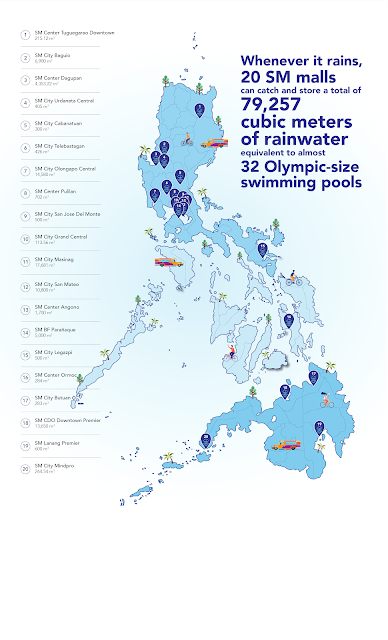SM Turns to Rain Water Harvesting a key to Living Flood Free
Climate change is real and Filipinos are among those who can attest to the devastating effects it brings to everyday life. Faced with about 20 typhoons a year, the Asian Development Bank reported that the total impact from storms have reached about US$20 billion from 1990 to 2020. It causes a temporary disruption due to mass evacuations which bring about an average of 2-8% reduction in gross domestic product annually.
Despite the reoccurring devastation felt during calamities, Filipinos still manage to see the humorous side of life and are often reported as one of the happiest people in the world. However, this may soon be tested as, according to the latest report of the UN Intergovernmental Panel on Climate Change, things are about to get worse as the planet heats up, accelerating the effects of climate change and making the Philippines more vulnerable to drastic changes in weather patterns.
On average, the Philippines receives about 2,400 millimeters of rainfall each year, one of the highest in the world. While this poses a problem for the country, there is a silver lining, as it can also be the solution for water scarcity. However, currently the Philippines only harvests around 6% of its rainwater compared to India which harvests around 60% of the 700-millimeter average rainfall it receives each year.
“We approach it two ways: resilience – to help communities be flood free; and sustainability – to optimize water which is a scarce resource so we can use it for other purposes rather than just waste it. Wherever SM is, we try to help our communities become resilient to changing weather patterns. Nationwide, we have 20 malls equipped with rainwater catchment facilities that help rain water management to avoid flash floods for surrounding communities.” ~Architect Fides Garcia-Hsu, Vice President at SM Engineering Design and Development
Rain Water – a friend or a foe?
Water is a scarce resource. The United Nations Sustainable Development Goal number 6 identifies access to clean water as one of the global priorities to be achieved by 2030. Aligned to its environmental responsibility programs, SM takes a closer look at the use of water and how it can be turned from a foe to a friend.
SM builds its malls and integrated lifestyle cities with resilience and sustainability in mind. Understanding the value of water, SM builds rain water catchments in its malls to harvest large volumes of rain water particularly in flood prone areas.
Vermont Park and Vermont Royale are two communities that once saw rain as a foe. Every time it rained, their neighborhoods ended up under water, damaging their homes. Today, home owners welcome the rain as water that can be harvested and stored for future use. The reason? SM City Masinag’s rain water catchment facility! It has a 17,681 cubic meter water capacity. The two communities connected their drainage systems to the mall which is equipped with three 30HP submersible pumps which are used to pump out accumulated rain water.
As a company SM invests 10% of its capital expenditure to integrate disaster resilient and sustainability features in its malls and integrated lifestyle city designs. “We take a long-term view on resilience and when we talk about sustainability, we look at how we can address perennial problems like flooding and address systemic change,” Arch. Garcia-Hsu expounds.
Serving as pioneers in the installation of rain water catchment facilities, SM was instrumental in the passing ordinances and inclusion of the installation of water catchment facilities for developments by regulatory bodies. In recent years, Senator Manny Pacquiao passed the ‘Rain Water Harvesting Act – Senate Bill 1309’ mandating the establishment, maintenance and management of rain water harvesting systems in the country.
“Aside from building resilient infrastructure, we also build the resilience of our stakeholders by providing disaster preparedness training through our SM Cares programs. We have programs targeted to senior citizens and those with special needs as they are the ones left most vulnerable during times of calamities.” ~Chito Bauzon, SM Cares Marketing Asst. Vice President
With the threat of climate change looming, typhoons are only expected to get stronger with intensified rainfall. With more Filipinos moving to urban centers, the Philippines will need to retrofit its cities for resiliency or build new sustainability cities to finally live flood free.





Comments
Post a Comment